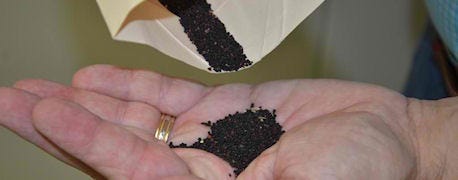August 14, 2013

A new arrowleaf clover variety will produce more forage with improved resistance to disease, according to its developer, Texas A&M AgriLife Research forage breeder Dr. Gerald Smith.
Smith says the new variety – dubbed "Blackhawk" – takes on natural resistance traits to the soil pathogen Pythium ultimum and to bean yellow mosaic virus.
Blackhawk traces its lineage back to dark-seeded lines from 1984 field selections of arrowleaf cultivars Yuchi, Amclo and Meechee, Smith adds. Though Yuchi is susceptible to seedling disease, resulting in 73% dead or severely diseased seedlings when inoculated in a lab setting, Blackhawk is resistant to the disease.

Texas A
That's good news for beef producers, particularly in the southern U.S. If planted or overseeded into warm-season pastures in the fall, it promises grazing for cattle in early spring when warm-season grasses are dormant.
Smith says as early as the 1960s, it was common practice to mix late-maturing arrowleaf seed with early-maturing crimson clover seed to have forage from February to June. But multiple viruses and fungal root diseases – like bean yellow mosaic virus – put an end to the practice by the 1990s.
It was in response to this problem that Smith developed and released Apache arrowleaf clover in 2001, which became a widely-used variety in the U.S. South.
Apache is similar to the newly-developed Blackhawk, though Blackhawk has natural resistance to many pathogens with the added benefit of going dormant about a week earlier than Apache. This means Blackhawk is less likely to compete with warm-season forages like Coastal or Tifton 85 Bermuda grass, Smith says.
Development of the two varieties took different paths, Smith notes, which allowed the added benefits to shine.
"On Apache, we started with a really broad germplasm base, and we selected for a number of generations for resistance to bean yellow mosaic virus," Smith says. "We stopped at that, and released Apache, and it's been a great variety for us, and continues to be a great variety."
With Blackhawk, however, Smith says his team used a large germplasm collection and selected initially for resistance to fungal seedling diseases.
"After we had resistance to those diseases, we selected for resistance to bean yellow mosaic virus. So essentially, Blackhawk has multiple disease resistance," he explains.
While Southern producers may have to travel to get the new variety, it will be available this fall from Northeast Texas Farmers Coop in Sulphur Springs, Texas, Greenville, Texas, and Canton, Texas.
View the video for more information on Blackhawk.
You May Also Like




